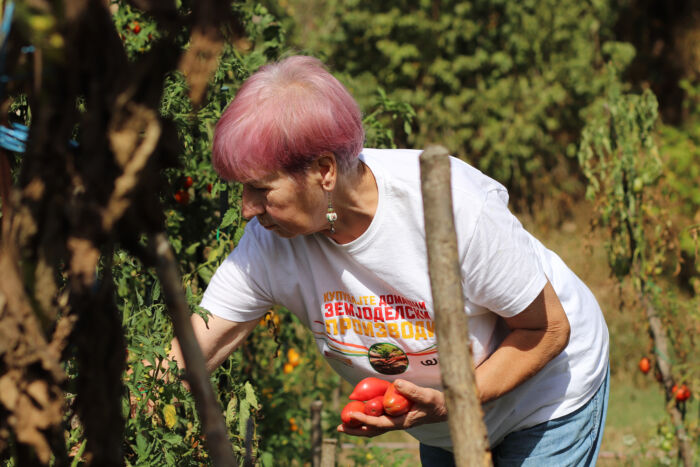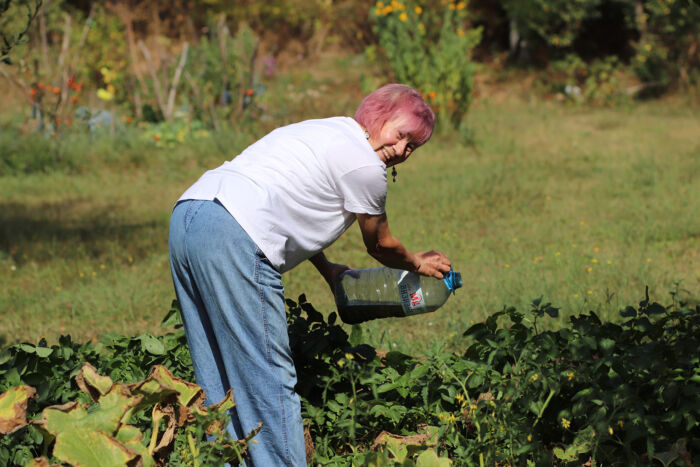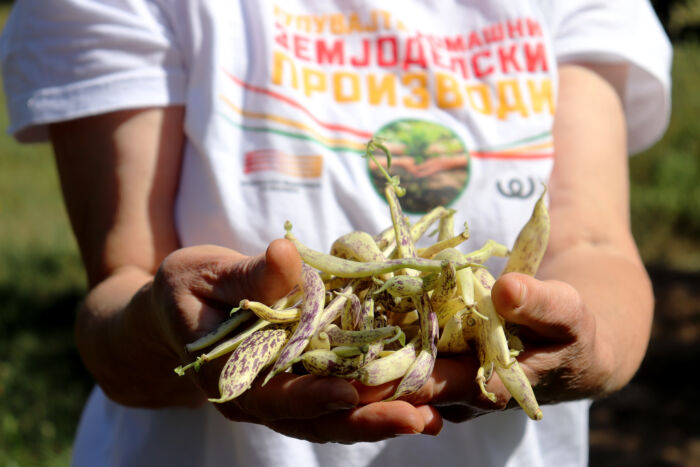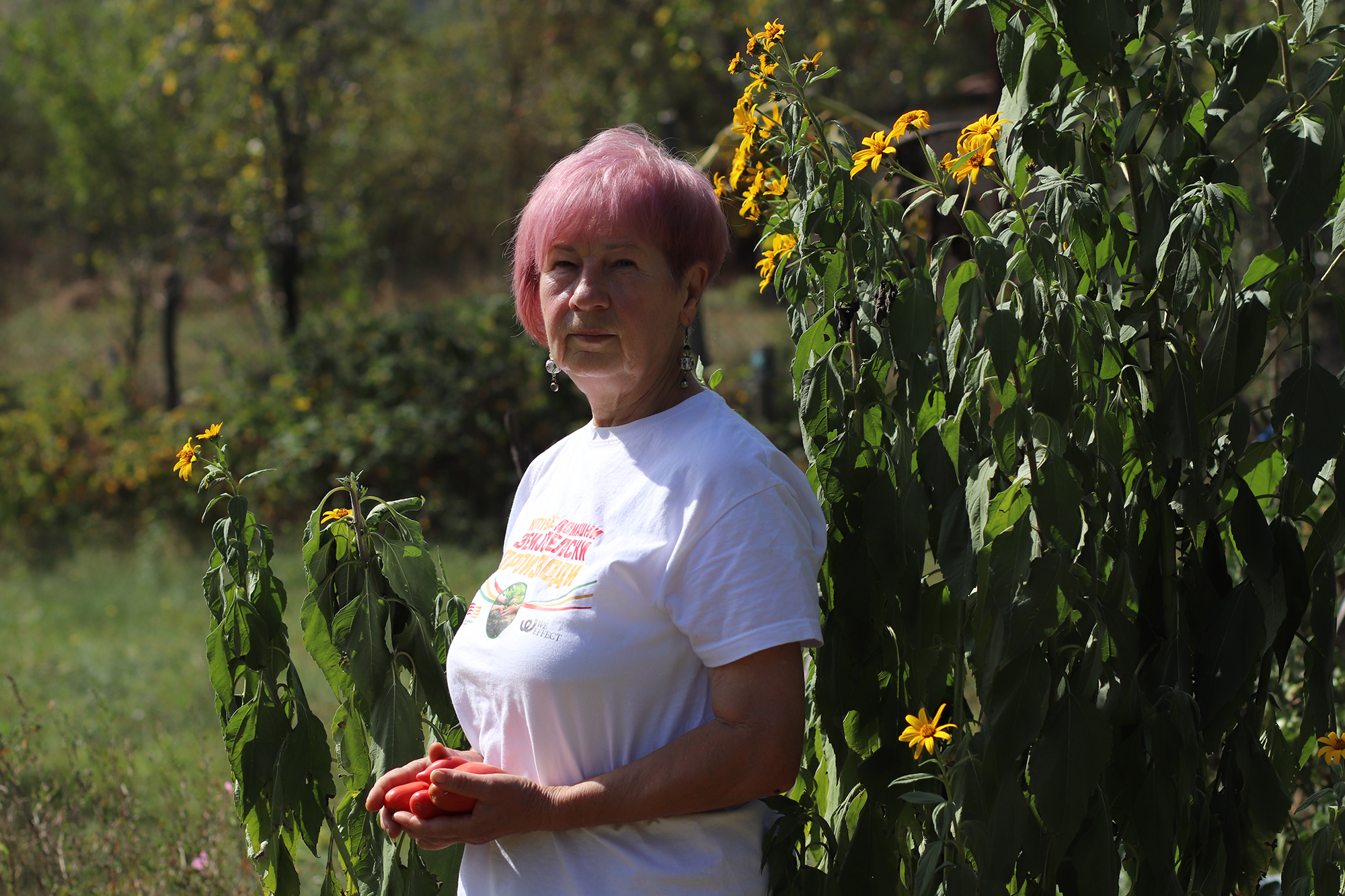From the first glance it’s clear that Svetlana is no ordinary farmer. She was born and raised in the country’s capital Skopje, but after some life-changing events decided to turn her focus on farming.
– Ten years ago, with my husband, we decided to move to the native village of my father, Machevo. I lost my job and since I am not a person that can sit idle all day, I decided to go into agriculture.
Organic farming was on her mind from the very start. And she had a very strong additional motive for relying strictly on natural processes in her work.
– In Skopje, with my husband, we used to produce roses and they require a lot of spraying with all kinds of artificial fertilizers, pesticides and fungicides. Otherwise, you wouldn’t get a satisfying product. A while ago, my husband died from cancer, as a result of his exposure to highly toxic matter present in all these fertilizers and pesticides.
Now, she is adamant:
I don’t spray anything anymore with any type of artificial substances. They tell us that if you don’t spray the plants, they will not bare any fruits, but that’s not true!

Although she has never been a farmer before, she accumulated farming techniques along the way, by reading about the organic methods and following successful practices in the region.
– I perform direct composting on the planting beds. First you put some branches, then freshly cut grass, after that dry hаy, next is the compost, i.e. organic fertilizers, and then again dry hаy. I mostly adhere to the principles of permaculture, but sometimes I experiment.
For Svetlana, organic farming and the permaculture method is a philosophy of sustainability that eliminates the use of synthetic fertilizers, pesticides, and growth regulators, relying instead on natural processes.
With the permaculture method, nothing is wasted. Everything is used and at the same time the environment is not getting polluted! The goal is – zero pollution.
Doing everything in line with nature is Svetlana’s motto. In her farming practices she uses only organic fertilizers and nourishment solutions, that she prepares herself, in order to enable natural plant growth and improve soil fertility.

She makes organic nitrogen fertilizer from nettles or peas and uses rice water, yeast water or lettuce soup as good sources for nourishment of the plants. She also prepares organic potassium fertilizer from flowering radishes and flowering spinach, as well as organic phosphorus fertilizer from marigold leaves.
– It’s very important to know what to use when and on which plants. For example, you use organic nitrogen fertilizer on the plants at the beginning when they need to develop green mass, but not after, because they need to blossom and give a yield. Only greens, like cabbage or lettuce, can be sprayed with the organic nitrogen fertilizer in continuity.
Svetlana doesn’t hide her joy when talking about the results she has now in her garden and the improved taste of her vegetables, especially the tomatoes.
Not only that I have better results, but I also have a greater variety of vegetables.
– Before, I only had a few vegetables planted in separate beds. Also, some of the vegetables were not succeeding so well. But now, with the permaculture method, I plant different vegetables next to each other and I have more varieties that succeed better. This also improves the soil quality.

It is no secret that conventional agriculture and farming methods, with their heavy usage of pesticides, insecticides, and other toxic chemicals, not only damage the soil quality over a period of time but are some of the biggest polluters of the environment and nearby waterbodies. This subsequently affects the biodiversity of the place, which, in turn, causes the loss of ecosystem and environmental degradation.
On the other hand, organic fertilizers increase soil organic matter, they improve the soil structure and the water holding capacity. Thus, they help reduce erosion from water and wind and they offer slow and consistent release of nutrients. Additionally, organic fertilizers are renewable, biodegradable, sustainable, and environmentally friendly.
– I see that the surrounding area is also improving. There is greater biodiversity.
The local community is also eager to embrace the novelties that prove successful.

Some of the neighbors that were very skeptical when I started with this, after seeing that my garden is blossoming and many vegetables are succeeding, are now also trying to implement some of these changes.
– Recently, one of them told me: I didn’t believe that you would have any yield, but now I see that your tomatoes are better than mine.
According to her, this is the goal – for the other farmers to see that it’s possible to have a good yield without using artificial fertilizers and substances and still achieve the same or even better results.
– I am grateful for the support we receive from We Effect and NFF in terms of awareness raising about the value of organic production. What we eat impacts our health, so it’s important to know how our food is produced.
Clearly, now when the environmental problems are becoming increasingly acute and health concerns are coming to the fore, finding sustainable solutions is of essence. And Svetlana believes that is not just a trend, but the future of agriculture.
